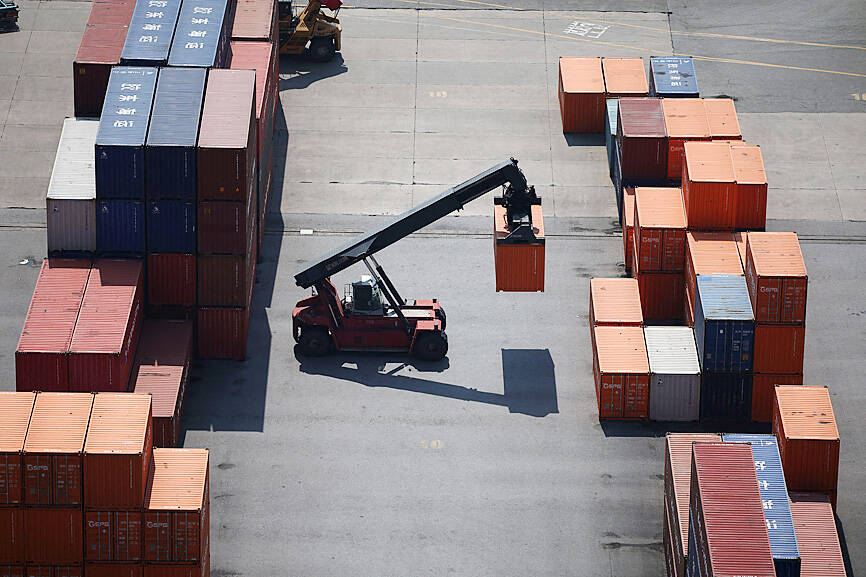South Korea has found increased attempts to disguise foreign products as Korean exports, primarily from China, to avoid US President Donald Trump’s sweeping tariffs, its customs agency said yesterday.
The Korea Customs Service (KCS) said that after a special probe last month, it has found 29.5 billion won (US$20.8 million) worth of contraventions related to products’ country of origin from the first quarter, with US-bound shipments accounting for 97 percent of the total.
That compares with a total of 34.8 billion won worth of contraventions for all of last year, among which US-bound shipments accounted for 62 percent.

Photo: Reuters
Trump has imposed significant tariffs on various products and countries, including those on China that began to rise in February.
“There was a rise in disguised export attempts during Trump’s first presidency, and we expect there to be a similar trend,” KCS investigation planning director Lee Kwang-woo said.
Anticipating increased risks, authorities conducted the latest investigation pre-emptively to prevent illegal exports.
They have already found signs of attempts to avoid Trump’s tariffs from the first quarter, Lee said during a news briefing.
South Korean officials have said there could be a rise in attempts by foreign companies, such as those in China, to use South Korea as a bypass to avoid tariffs and regulations.
Trump slapped 25 percent tariffs on South Korea this month, among a new set of sweeping levies, which were later suspended for three months. In comparison, the US now levies 145 percent tariffs on China after back-and-forth retaliatory actions.
Yesterday’s findings include 3.3 billion won worth of cathode materials used for batteries, imported from China and shipped to the US, with South Korea falsely marked as the country of origin to avoid already high tariffs in January, even before Trump’s tariffs took effect.
In addition, 19.3 billion won worth of surveillance cameras last month were imported from China in parts and reassembled in South Korea to bypass US restrictions on Chinese communication devices, the KCS said.

Taiwan will prioritize the development of silicon photonics by taking advantage of its strength in the semiconductor industry to build another shield to protect the local economy, National Development Council (NDC) Minister Paul Liu (劉鏡清) said yesterday. Speaking at a meeting of the legislature’s Economics Committee, Liu said Taiwan already has the artificial intelligence (AI) industry as a shield, after the semiconductor industry, to safeguard the country, and is looking at new unique fields to build more economic shields. While Taiwan will further strengthen its existing shields, over the longer term, the country is determined to focus on such potential segments as

UNCERTAINTY: Innolux activated a stringent supply chain management mechanism, as it did during the COVID-19 pandemic, to ensure optimal inventory levels for customers Flat-panel display makers AUO Corp (友達) and Innolux Corp (群創) yesterday said that about 12 to 20 percent of their display business is at risk of potential US tariffs and that they would relocate production or shipment destinations to mitigate the levies’ effects. US tariffs would have a direct impact of US$200 million on AUO’s revenue, company chairman Paul Peng (彭雙浪) told reporters on the sidelines of the Touch Taiwan trade show in Taipei yesterday. That would make up about 12 percent of the company’s overall revenue. To cope with the tariff uncertainty, AUO plans to allocate its production to manufacturing facilities in

COLLABORATION: Given Taiwan’s key position in global supply chains, the US firm is discussing strategies with local partners and clients to deal with global uncertainties Advanced Micro Devices Inc (AMD) yesterday said it is meeting with local ecosystem partners, including Taiwan Semiconductor Manufacturing Co (TSMC, 台積電), to discuss strategies, including long-term manufacturing, to navigate uncertainties such as US tariffs, as Taiwan occupies an important position in global supply chains. AMD chief executive officer Lisa Su (蘇姿丰) told reporters that Taiwan is an important part of the chip designer’s ecosystem and she is discussing with partners and customers in Taiwan to forge strong collaborations on different areas during this critical period. AMD has just become the first artificial-intelligence (AI) server chip customer of TSMC to utilize its advanced

Chizuko Kimura has become the first female sushi chef in the world to win a Michelin star, fulfilling a promise she made to her dying husband to continue his legacy. The 54-year-old Japanese chef regained the Michelin star her late husband, Shunei Kimura, won three years ago for their Sushi Shunei restaurant in Paris. For Shunei Kimura, the star was a dream come true. However, the joy was short-lived. He died from cancer just three months later in June 2022. He was 65. The following year, the restaurant in the heart of Montmartre lost its star rating. Chizuko Kimura insisted that the new star is still down